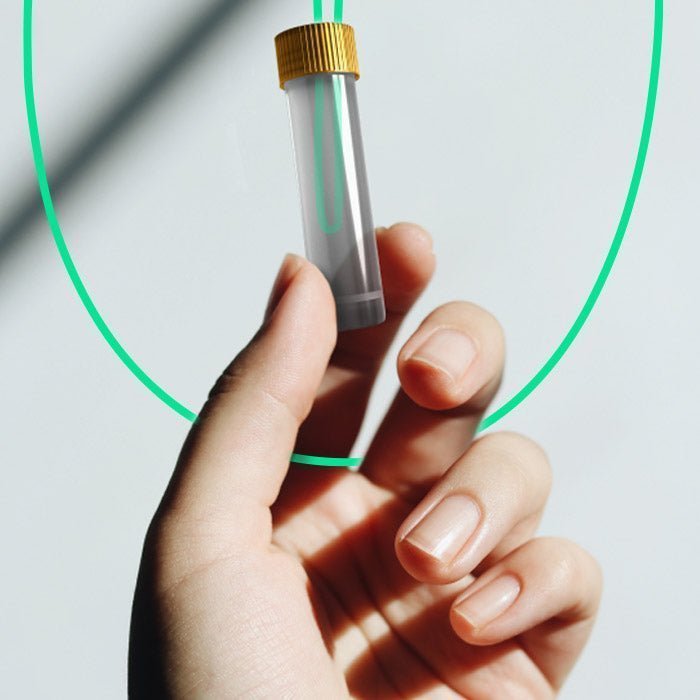
Medically reviewed by Kate Hilton RD
On 4 April 2024
How does a gut microbiome test work?
The gut microbiome is home to trillions of different types of microorganisms, a gut microbiome test analyses the composition, balance and diversity of those microorganisms and can provide an overall picture and valuable insights into the state of your gut health.
The test is non-invasive and typically involves collecting a small stool sample at home using a testing kit that has been provided. The stool sample is then sent to a laboratory where it is tested using advanced sequencing technologies to identify the microorganisms present in your gut.
Gut microbiome tests can vary in how comprehensive they are, some providers will give you the original lab report showing just the different levels of bacteria, however they can be quite difficult to understand as they have not been interpreted by a medical professional and will provide no guidance around what they mean.
One of the more well known gut microbiome tests, the Gi Map; would usually provide the original lab report which would later need interpreting from a medical professional. However the Gi Map test is now available with fully interpreted results.
Others will provide you with the full report and interpreted results that give valuable information such as your microbiome diversity and how it is impacting your overall health along with actionable insights to improve it.
Why should you test your microbiome?
Most people who take a gut microbiome test are suffering from symptoms and have tried multiple treatments without success or answers. A gut microbiome test can help to identify the route cause of those symptoms and give you a personalised plan to reduce symptom causing bacteria, not only improving your symptoms but also giving you the answers into what is causing them.
Testing your microbiome offers invaluable insights into the health and functioning of your gut, it can also give you an idea as to how your microbiome is supporting your overall health and wellness.
A microbiome test can reveal imbalances in beneficial and harmful bacteria and can help to identify gut dysbiosis which can lead to conditions such as irritable bowel syndrome (IBS), and inflammatory bowel disease (IBD) and many more inflammatory and autoimmune diseases.
It can also help identify potential causes of common digestive symptoms such as bloating, constipation, or diarrhoea, and provide you with personalised dietary and lifestyle modifications to improve overall health.
How to test your gut microbiome?
Before testing your microbiome, it is important to know what you want to gain from your results. Most people will want to understand the full picture of their gut health, identify any imbalances, learn about how their microbiome profile is impacting their health and most importantly understand how to improve their gut health under the advice and guidance of a gut health expert.
To test your microbiome, start by ordering your test kit, this will include everything you need to perform the test and comes with full instructions including a stool cotton swab, stabilising solution, sample transportation bag, return envelope and packaging to send your sample back to the lab.
Once you have provided your sample, use the pre-paid packaging to send it back to the lab, the lab will then test your sample. Your results will be emailed to you and will take between 3-5 weeks due to the comprehensive testing and analysis that is involved with testing thousands of different microorganisms.
Learn more about our labs and testing process.
What can a microbiome test find?
A microbiome test can identify:
- The diversity, variety, and abundance of microorganisms within your gut
- The presence of beneficial microbes, such as probiotic strains.
- Potential overgrowth of pathogenic or harmful bacteria.
- Gut dysbiosis (imbalance of beneficial and harmful bacteria)
- Microbiome age (a helpful indicator to assess your overall gut health)
- Specific bacteria strains known to cause symptoms.
- Identify and match foods specifically to your microbiome profile.
- How well your gut microbiome synthesises vitamins and absorbs minerals.
Comprehensive gut microbiome tests can also assess your risk of developing a number of conditions that are influenced by the gut microbiome such as:
- Skin disorders such as eczema, acne, rosacea and psoriasis influenced by the gut-skin axis.
- SIBO
- Fungal overgrowths
- Autism spectrum disorders
- Lactose intolerance
- Migraine
- Food intolerance
- Respiratory disorders
- IBS
- Constipation
- Diarrhoea
- Autoimmune disorders
- Gluten intolerance
- Irritable bowel disease
- Cardiovascular disease
- Thyroid related disorders
- Liver disorders
- Obesity
- Blood sugar disorders
- Kidney related disorders
- Phenylketonuria
What will the results tell me?
The results of a microbiome test will give you a comprehensive overview of the bacterial landscape in your gut, along with actionable insights, interpreted results and a lifestyle plan from a gut health expert.
- The diversity score of your microbiome, which is linked to overall health.
- The balance between different types of bacteria, including probiotics and potentially harmful pathogens.
- How your microbiome compares to other healthy microbiome profiles.
- Personalised supplement recommendations
- Personalised food list matched to your microbiome profile.
- Your risk of developing chronic conditions
How much does it cost?
The cost of our microbiome test is £299, this price is all inclusive of delivery both ways (to you and back to our lab), testing process, interpreted results, full personalised report, food list, supplement recommendations, and lifestyle plan from our gut health expert.
Is gut health testing available on the NHS?
Gut microbiome testing is not currently available on the NHS, they are primarily sold by private healthcare providers.
Can it find/spot specific conditions?
Gut microbiome tests can identify imbalances that are linked to many conditions such as IBS, IBD, obesity, diabetes, food intolerances, autoimmune diseases, digestive disorders and many more. However, they should not be used as a sole diagnostic tool but rather as part of a comprehensive health assessment.
What is the best microbiome test?
The best microbiome test will depend on your specific goals and needs. We recommend a comprehensive test that provides you with a complete picture of your gut health as well as interpreted results and actionable insights to improve your gut health after testing.


